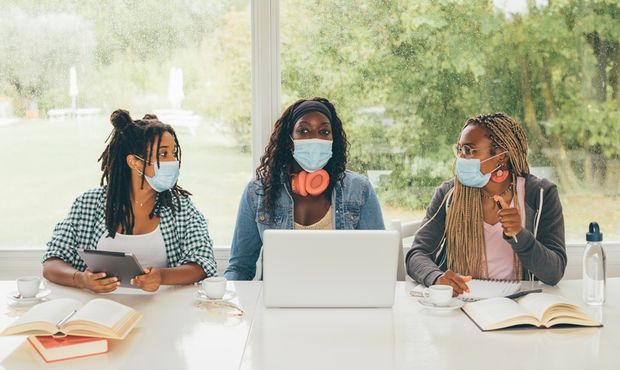Social Distancing – two words we never would have put together, but have been hearing side by side for months now. Being inundated with new information day after day, hour after hour, has been tiresome for many. Our concerns go beyond ourselves as we think about our teenage population at a crucial point in their social and emotional development. What does this mean for our teens? What does it mean for them to be socially distant from their friends? How can we keep them safe without ignoring this important time of development?
Being an adolescent is difficult enough without a pandemic, but here we are. What can you do to help your teen understand and follow social distancing?
What is social distancing?
Social distancing means keeping a 6‑foot distance from other people. Also called “physical distancing”, a 6‑foot distance is about two arm’s length apart. According to the CDC, keeping a social distance (and limiting gatherings to 10 or fewer people) is the most effective way to help prevent the spread of disease.
How can I explain it to my teen?
Teens may not necessarily take social distancing seriously. It may be that they think you are being overly cautious or purposefully keeping them from their friends. At this age, the part of their brain that helps them to think through consequences and be less impulsive isn’t completely developed yet. In addition, teens are at a point in their lives where they are developing their identity. Teens also have a sense that they are invincible. Taking all of this into consideration, the following are some suggestions on how to talk with them about what social distancing is and why it’s important:
Practice patience, understanding and sympathy.
They have missed out on opportunities they will never get to have again. They need sympathy from you and time to grieve the loss of these moments in their lives.
Give your teens positive affirmations and reinforcement when you find them doing something well.
If they are upset about social distancing but are abiding by the rules anyway, then a positive affirmation may be something like this, “I know this is really difficult for you; I’m proud of you for taking the time to understand the importance of social distancing.”
Possibly the most important piece of helping your teen in social distancing is following it yourself.
Model how to social distance, talk about your own challenges of not seeing friends in the way we are used to and discuss ways you’ve problem-solved with driveway dinners, using technology and more.
Talk with your teen about what social distancing means and how they can practice it while still being able to spend time with their friends.
Have a conversation with them about compromise: maybe they can’t spend time outside of the house with their friends, but can have a social distanced gathering with them in your yard.
The Institute for Personal Development (IPD), a member of DuPage Medical Group, provides mental and behavioral health services to help individuals achieve long-lasting emotional, mental and physical well-being. If you would like to learn more or schedule an appointment, please call 815−942−6323.
Health Topics:







